The Red Thread Read online
Page 2
The sun is setting, turning the sky a beautiful lavender, the clouds violet and magenta and gray-blue. Chun has not allowed herself to call this baby anything. But now she leans forward to kiss the top of her daughter’s head, and as she does so she whispers, “Xia”—colorful clouds.
Then Chun takes the now-sleeping baby and settles her into the basket. She places the cotton blanket over her snugly, being sure to tuck it in tight. The basket is of a type particular to her village. Someone who knows her village, who has traveled the seven hours down the back roads, past fields of kale, would recognize this basket. They would see this sleeping baby in this particular basket and know where she had come from. The blanket too might provide a clue. It is made of pieces of Chun’s own clothing, with fabric bought in the village. The purple and navy blue cotton had been her own pants and tunic. She cut them carefully into squares and sewed those squares together the day after the baby was born, knowing what she would have to do. But a person who had visited her village might be able to say that this fabric came from there.
Chun chides herself for her sentimentality. It is a bad idea to leave clues. Her very own neighbor was recently caught leaving an infant daughter in this very city where Chun now stands staring down at Xia. This neighbor brought the baby right up to the door of the social institution, leaving her in a box that had held melons sold in the village market. She had placed the baby there at sunrise, then stood half hidden behind cars parked in the yard.
When the head of the institution arrived for work, she saw the woman there and said sternly, “You! What are you doing in this yard?”
Of course the neighbor tried to run, but either fear or guilt kept her there, frozen to that spot behind the cars, crouched and trembling.
“You do know that I am legally obliged to call the police if you have left something here?” the woman said. Her eyes darted to the doorway where the box sat with the baby inside.
“Is that yours?” the woman said, her voice kinder now. “I will turn around, and when I look in your direction again, you and your belongings should be gone.”
The woman did just that. She turned around and waited several minutes.
Chun’s neighbor ran to the door and took her daughter from the box that had held melons and fled that yard. When she returned home later that day, dusty and hungry, with the baby in her arms, her husband slapped her so hard that she fell to the floor.
What else could he do? Chun’s husband asked her when she told him this story which the neighbor herself had told Chun. And Chun had answered, Nothing. There was nothing else he could do.
She did not tell her husband the rest of the story, how the neighbor’s husband had taken the baby from her, and set off down the road that led out of the village himself. He left instructions for his parents to not let his wife back in the house until he returned. Luckily it was summer, and the woman slept in the garden and ate the radishes that grew there. Her breasts began to leak milk, and to grow hard and painful from the need to nurse her daughter. Inside, her older daughter peered from the window, curious about her mother sitting alone in the dirt with large wet circles spreading across her cotton dress. But the child was too young to ask questions or to help her mother, who began to wail as time passed and her breasts ached and overflowed and her husband did not return.
That night she slept outside in the dirt, and the next day she ate radishes for breakfast, and then, out of her mind from pain and grief, she unbuttoned her dress and squeezed the milk from her breasts even though she saw her mother-in-law staring at her. Her lip where her husband had hit her felt swollen and she could still taste the iron of her blood there. And she bled from her recent childbirth so that the inside of her legs felt sticky. Her breasts could not seem to empty of their milk and ached even more.
When her husband came home empty-handed that afternoon, he did not let her in. He did not even make eye contact with her. He simply ignored her. The sounds of her husband and their daughter and her in-laws making dinner and eating together, the smells of ginger and hot pepper, all of it assaulted her. She called to them to let her in, to give her food. But it wasn’t until the next day that he appeared at the door and motioned her inside.
What have we learned from this? Chun’s husband had asked her.
She shook her head.
Number one, he said: Leave the child when it is dark. Number two: Walk away. Number three: Do not go to the institution.
Number four, Chun said.
Number four? her husband asked, confused.
Number four, Chun said, do not love the child.
DARKNESS HAS FALLEN. It is time.
Chun lifts the basket carefully so as not to wake Xia. She emerges from the cluster of trees at the edge of the park and walks across the grass, past the abundant flowers, to the pavilion. Tomorrow is the first day of the Flower Festival and this now-empty park will be filled with people. Someone is sure to find this basket from the distant village with the baby girl inside it, and when they see the precious gift there that person will surely take Xia to the appropriate place.
She has been told not to wait to be certain this happens. Her husband has warned her to walk away. But the night is so dark and the basket looks so small, like a toy, that Chun finds she cannot leave. She stands in the dark, silent park, hesitating. Would it be so terrible to go back to that cluster of trees and wait there? From that place she can see the pavilion. She will be able to see a person emerge with the basket that holds Xia. She will not have to tell her husband that she has done this. She can simply say that the long walk made her weary and that she slept a long time before heading back home.
Satisfied with her plan, Chun walks back past the flowers, across the grass, to the cluster of trees. She takes the sling that had just a few hours ago held her newborn daughter and rolls it up like a pillow to put beneath her head. As she looks upward, the leaves make a pattern like lace against the sky. Chun stares at this pattern and thinks of how she does not want to make this journey again.
Last year she had a daughter whom she left at the police station of a different city. The year before she had a daughter whom her husband had agreed, reluctantly, to keep. She does not want her heart broken again. How many daughters can a woman lose and still love her husband? Still cook dinner and grow vegetables and smile at others? Her heart is broken into so many pieces already. One daughter who knows where? One daughter in a basket across the park waiting for someone to find her.
Yet even today, only five days after this child was born, her husband had smiled at her and said, Hurry back, and Chun had known he meant hurry back so that we can try again for a son.
But Chun feels certain that she was made to only have daughters. She stares up at the leaves and considers her dilemma. Can a woman turn her own husband away in bed? Can she deny him his needs, his longing, his son? Chun has no answers. She knows only this: She cannot abandon another baby.
Her eyelids grow heavy and her mind goes where she does not want it to go. Last year, when she left her three-day-old daughter on the steps of the police station, it was January and cold. What Chun fears is that despite the layers of clothing, despite the blankets she’d so carefully swaddled the baby in, despite her pleading with the heavens to protect her baby, the child did not get found in time and froze to death in the winter night.
The thought jolts her awake. Chun sits up, her heart beating hard. Even though it is not quite dawn, trucks are pulling into the park. Chun stumbles to her feet. Her mouth is dry and foul-tasting. Her breasts are heavy with milk. She puts her hand to her chest as if that small gesture can stop the pounding of her heart. Men in orange work clothes emerge from the trucks and begin unloading chairs, swaths of cloth, equipment of some kind. They move toward the pavilion, their figures slowly illuminated in the rising sun.
Then Chun hears the sound of excited voices. One of the men lifts her basket high, like he has won a prize, and hands it down to the men. Xia is lost in a blur of orange. Chun waits, unsure
of what to do. Then she turns from the park and walks north, toward home, with quick determined steps.
“Who will get this baby?” Wang Chun asks out loud. “Who will take her in and cherish her?”
Of course, she has no answers. Only a mother can love a baby the right way. Only a mother truly cherishes her children. Something in her wants to go back and shout: That is my daughter! But Wang Chun keeps moving steadily away.
MAYA
Maya stood in her office surrounded by pictures of the children. Dark-haired girls grinned at the camera from under Christmas trees or inside spinning Disneyland pink teacups or sitting on green grass in front of tulips or rosebushes or in bedrooms so white and frilly they seemed to be made for princesses. The pictures told Maya that these children, once abandoned somewhere in China and brought to orphanages where they often slept two or three or four to a crib, these children were now happy. In fact, not just happy, but special. They had toys and vacations and pretty clothes. Look at me! the pictures seemed to say. Look at how happy and special I am.
On the morning before an orientation, Maya liked to come in early, before her secretary Samantha or her assistant Jane arrived, before documents appeared for her to scrutinize and phones began ringing. On these mornings, like this morning, Maya came in early with her Venti no-fat no-foam latte and looked at the pictures of the children. Since 2002, when she opened the Red Thread Adoption Agency in a one-room third-floor walk-up office in an old foundry, Maya had placed four hundred and fifty-one children from China.
At six o’clock tonight, prospective families would begin step one of the adoption process, an orientation in the office suite. The new offices on Wickenden Street were spacious, a maze of rooms with glowing computer screens and gleaming desks, conference rooms and coffeemakers, central air-conditioning, fax machines, copy machines, nameplates on the doors. And the pictures of those four hundred and fifty-one children everywhere. Maya never told anyone, but she knew each child’s name—the Chinese ones the orphanages gave them and their new American ones. She knew which province they came from and where they lived now.
Once, she had heard Samantha and Jane gossiping about her.
“She knows them,” Samantha had whispered. They were making a fresh pot of coffee, standing in the corner, heads bent together. “Every one of them.”
“Even Maya Lange can’t remember over four hundred names like that,” Jane said.
Maya stood outside the doorway until the conversation switched to Samantha’s date the night before. Samantha was a relentless dater, determined to meet the right man and to marry him and move out to East Greenwich or some other suburb where the houses had shutters and rolling lawns. Quietly, Maya slipped back to her office and sat at her desk wondering if they found knowing all those children by name a spectacular accomplishment or an embarrassing oddity. She knew that Samantha and Jane were both slightly afraid of her. She was a perfectionist who did not understand mistakes. In her business, they dealt with children, and families who wanted children desperately. There was no room for error. One misplaced form, one incorrect piece of information, and a family could lose their place in the queue. A child could have to wait months longer for a home. Or worse.
Sometimes Maya wondered what these women would think if they knew anything about her own life. If she told them, This is what happened to my first husband and me long ago, would it make them like her more? If she explained how that one terrible thing had allowed her to make bad decisions, would they feel closer to her? She didn’t want or need them to like her or want to be her friend. But she did wonder if they saw her as more human how that would change everything.
On this morning before the orientation, Maya found herself wondering these things again. She sighed and turned her attention to organizing. Maya found comfort and escape in getting things ready for her families. Their path to a baby was a long one, she knew. The orientation tonight. Then all of the paperwork, gathering their birth certificates and tax forms, bank statements and letters of recommendation. They had to be fingerprinted and have a criminal check. A social worker had to do three home studies, making sure they had a safe house with a room for the baby. And then more paperwork: U.S. approval, and all of those documents sent to China. This took six months to complete, and at the end of that time there was nothing to do except wait for China to send a referral. Maya had seen that wait be as short as a year and as long as three years.
Maya sipped her coffee and grimaced. No matter how many times she asked for no foam, the girl—the barista! and thinking this she laughed—couldn’t get it right. Still, the bitter espresso tasted good and Maya let herself pause a moment in her ritual to think about Jack and how he had indeed asked for her phone number, standing by her bright orange VW Bug in the restaurant parking lot. She had felt an almost-forgotten stirring that night when he leaned down and kissed her. Just one kiss, but it had oddly moved her. Maya smiled thinking about it, but then reprimanded herself. What was the point in romanticizing something that was never going to happen? She straightened her skirt, as if allowing even the tiniest bit of intimacy into her thoughts had mussed her up somehow. Maya took another sip of her coffee. Perhaps she would write a letter to the company about foam in lattes.
But not today. Today she would get ready to meet the new potential families. She went to the wall that held the earliest pictures and took a deep breath. Olivia. Ariane. Melissa. Her finger touched each photograph lightly as she said the girls’ names. Kate. Caitlin. Michelle. Julie. Isabella. Rose. Morgan. Maya smiled. There they were. The first ten. All of them brought home from Sichuan Province in December 2002. She’d gone with the families that first time, making sure everything went perfectly. Julie’s parents lost their passports and Maya had taken care of that. Olivia’s parents didn’t have their money for the orphanage donation in clean, unwrinkled bills, and Maya had taken care of that, finding a bank in the middle of nowhere that had over a thousand new American dollars and convincing them to take the slightly used ones in return. Then Jordan had developed a fever and Maya had taken her to the local hospital and stayed with her through the night until the fever subsided. Michelle’s mother had forgotten to mention that she had a peanut allergy and went into anaphylactic shock during the farewell dinner. But Maya had remembered that Caitlin’s mother was allergic to bees and had an epi pen which Maya retrieved and administered herself.
Every detail. Every problem. Every child, her responsibility. And despite the lost passports and the wrong money and the fever and the peanut allergy, everything was perfect. Here were these ten girls, all of them happy, special. Maya slid her finger down to the next row and repeated the same process. Ali. Elizabeth. Joy, she said, her finger lightly touching each shiny image until she had worked her way across this wall, and the bulletin board in the hallway and the other one in the orientation room and the one by the entrance door. Four hundred and fifty-one children. By the time she had finished, the front door swung open and Samantha walked in.
“You’re here early,” she said in the Rhode Island accent that grated ever so slightly on Maya’s nerves. “Orientation tonight, huh?”
“Yes,” Maya said. “I think I would like the Little Schoolboy cookies. The dark chocolate ones. And that Paul Newman lemonade.”
“Pink? Or regular?” Samantha said.
Reg-u-lah. Maya shuddered. “Regular,” she said precisely.
If Samantha noticed, or cared, she didn’t let on. She slid into her seat behind her desk and placed the earphone behind her short dark hair, ready for the day to begin.
IN THE SUMMER of 2001, after Maya’s divorce was final and she had left Honolulu and her life behind for a part-time job teaching marine biology at the University of Rhode Island, her parents took her to China with them for a monthlong vacation. She had not wanted to go. Instead, she wanted to sit in her apartment on Transit Street in Providence, and drink too much wine and watch bad TV movies, alone. But perhaps knowing this was what she would do, her mother insisted. She b
ought her a ticket even after Maya said she didn’t want to go and sent her guidebooks with key attractions highlighted in bright green. The terra-cotta soldiers. The Great Wall. The Forbidden City.
Ever since Maya’s parents retired, all they did was travel. Patagonia, Peru, Cambodia. Now China. They had both been marine biologists who taught at the University of California in Santa Cruz, and Maya grew up trying to get their attention. Her parents loved science more than anything. It was what they discussed at dinner. It was how they spent their weekends and vacations, in labs and peering into microscopes. Maya learned early that to be a part of this family, she too needed to love science. When she won the Northern California Science Fair’s first prize in fourth grade for her project on the nervous system of jellyfish, her parents finally noticed her. Until she grew up and left them and they could go back to what they loved best: science and each other.
After her divorce and a move across the country to a cold climate, they noticed her again. Her mother had never been very good at parenting, relying on clichés to make her points. “One door opens and another closes,” was one of her favorites. And “Tomorrow is another day.” Maya could not imagine a month of clichés when her heart was so broken and her life so destroyed. But as each step of the trip clicked into place—visas obtained, tours booked, airplane seats selected—she found herself swept up in the idea of an exotic place where she could not understand the language, where nothing had the fingerprints of her old life on it.
When she stepped off the plane in Beijing and saw her parents waiting for her, she rushed into their arms. But in spite of the foreign locale, China was distorted by the stunned, wounded person Maya had become. You need help! her mother would shout at her when she found Maya drunk in the hotel lounge at night. You need therapy! Hot and hungover, Maya climbed the Great Wall and ate dim sum and listened to tour guides with their thick, almost undecipherable accents.
One morning, the guide met their small tour group in the lobby, excited.

 Kitchen Yarns
Kitchen Yarns Waiting to Vanish
Waiting to Vanish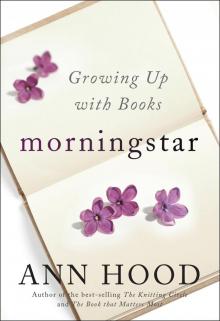 Morningstar
Morningstar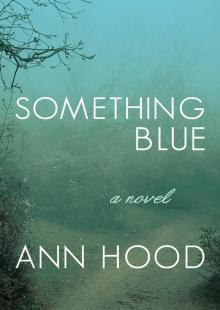 Something Blue
Something Blue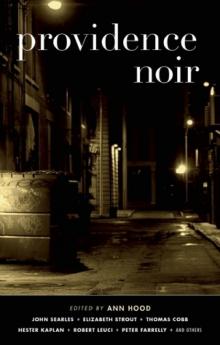 Providence Noir
Providence Noir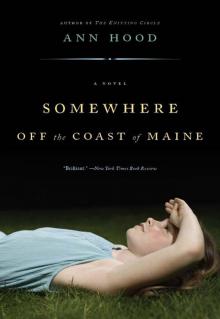 Somewhere Off the Coast of Maine
Somewhere Off the Coast of Maine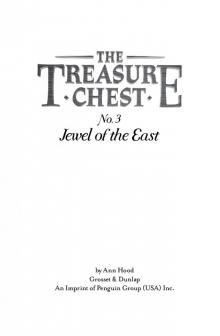 Jewel of the East
Jewel of the East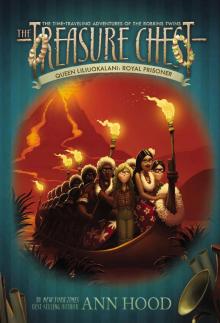 Queen Liliuokalani: Royal Prisoner
Queen Liliuokalani: Royal Prisoner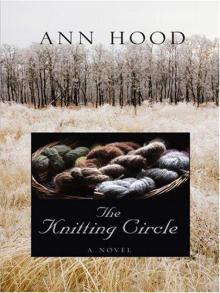 The Knitting Circle
The Knitting Circle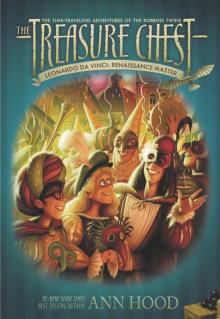 Leonardo da Vinci: Renaissance Master
Leonardo da Vinci: Renaissance Master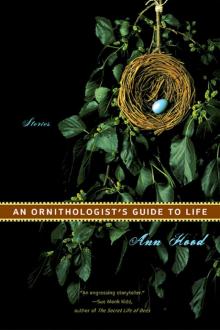 An Ornithologist's Guide to Life
An Ornithologist's Guide to Life The Red Thread
The Red Thread She Loves You (Yeah, Yeah, Yeah)
She Loves You (Yeah, Yeah, Yeah)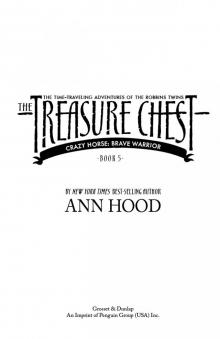 Brave Warrior
Brave Warrior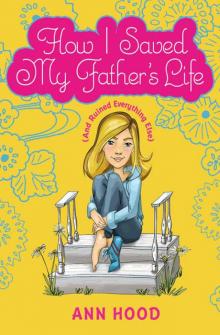 How I Saved My Father's Life (and Ruined Everything Else)
How I Saved My Father's Life (and Ruined Everything Else) An Italian Wife
An Italian Wife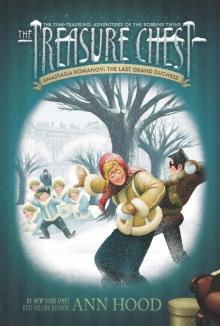 Anastasia Romanov: The Last Grand Duchess #10
Anastasia Romanov: The Last Grand Duchess #10 Prince of Air
Prince of Air Amelia Earhart: Lady Lindy
Amelia Earhart: Lady Lindy Places to Stay the Night
Places to Stay the Night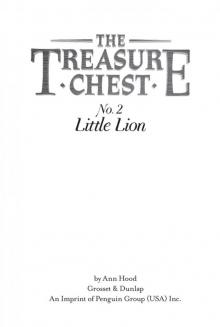 Little Lion
Little Lion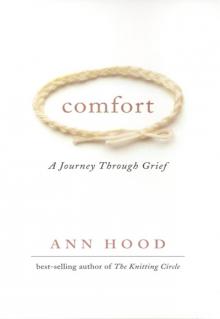 Comfort
Comfort Angel of the Battlefield
Angel of the Battlefield